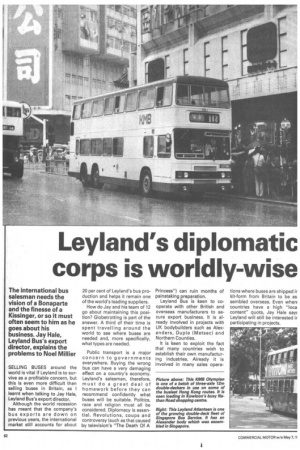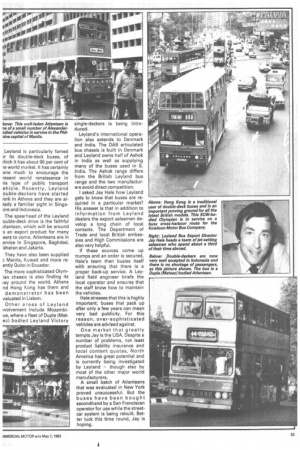Leyland's diplomatic corps is worldly-wise
Page 64

Page 65

If you've noticed an error in this article please click here to report it so we can fix it.
The international bus salesman needs the vision of a Bonaparte and the finesse of a Kissinger, or so it must often seem to him as he goes about his business. Jay Hale, Leyland Bus's export director, explains the problems to Noel Milker
SELLING BUSES around the world is vital if Leyland is to survive as a profitable concern, but this is even more difficult than selling buses in Britain, as I learnt when talking to Jay Hale, Leyland Bus's export director.
Although the world recession has meant that the company's bus exports are down on previous years, the international market still accounts for about 20 per cent of Leyland's bus production and helps it remain one of the world's leading suppliers.
How do Jay and his team of 12 go about maintaining this position? Globetrotting is part of the answer. A third of their time is spent travelling around the world to see where buses are needed and, more specifically, what types are needed.
Public transport is a major concern to governments everywhere. Buying the wrong bus can have a very damaging effect on a country's economy. Leyland's salesman, therefore, must do a great deal of homework before they can recommend confidently what buses will be suitable. Politics, race and religion must all be considered. Diplomacy is essential. Revolutions, coups and controversy (such as that caused by television's "The Death Of A Princess") can ruin months of painstaking preparation.
Leyland Bus is keen to cooperate with other British and overseas manufacturers to secure export business. It is already involved in projects with UK bodybuilders such as Alexanders, Duple (Metsec) and Northern Counties.
It is keen to exploit the fact that many countries wish to establish their own manufacturing industries. Already it is involved in many sales opera tions where buses are shipped ir kit-form from Britain to be as sembled overseas. Even wher; countries have a high "loca content" quota, Jay Hale say; Leyland will still be interested ir participating in projects.
Leyland is particularly famed )r its double-deck buses, of fhich it has about 90 per cent of le world market. It has certainly one much to encourage the resent world renaissance in us type of public transport ehicle. Recently, Leyland ouble-deckers have started fork in Athens and they are alaady a familiar sight in Singaore and Indonesia.
The spearhead of the Leyland louble-deck drive is the faithful Itlantean, which will be around s an export product for many ears to come. Atlanteans are in ervice in Singapore, Baghdad, 'eheran and Jakarta.
They have also been supplied Manila, Kuwait and more reently Quito in Ecuador.
The more sophisticated Olymian chassis is also finding its /ay around the world. Athens nd Hong Kong has them and demonstrator has been valuated in Lisbon.
Other areas of Leyland wolvement include Mozambiue, where a fleet of Duple (Metec) bodied Leyland Victory single-deckers is being introduced.
Leyland's international operation also extends to Denmark and India. The DAB articulated bus chassis is built in Denmark and Leyland owns half of Ashok in India as well as supplying many of the buses used in S. India. The Ashok range differs from the British Leyland bus range and the two manufacturers avoid direct competition.
I asked Jay Hale how Leyland gets to know that buses are required in a particular market? His answer is that in addition to information from Leyland dealers the export salesmen develop a long chain of local contacts. The Department of Trade and local British embassies and High Commissions are also very helpful.
If these sources come up trumps and an order is secured, Hale's team then busies itself with ensuring that there is a proper back-up service. A Leyland field engineer briefs the local operator and ensures that the staff know how to maintain the vehicles.
Hale stresses that this is highly important; buses that pack up after only a few years can mean very bad publicity. For this reason, over-sophisticated vehicles are advised against.
One market that greatly tempts Jay is the USA. Despite a number of problems, not least product liability insurance and local content quotas, North America has great potential and is currently being investigated by Leyland — though also by most of the other major world manufacturers.
A small batch of Atlanteans that was evaluated in New York proved unsuccessful. But the
buses have been bought secondhand by a San Franciscan operator for use while the street car system is being rebuilt. Better luck this time round, Jay is hoping.
















































































































